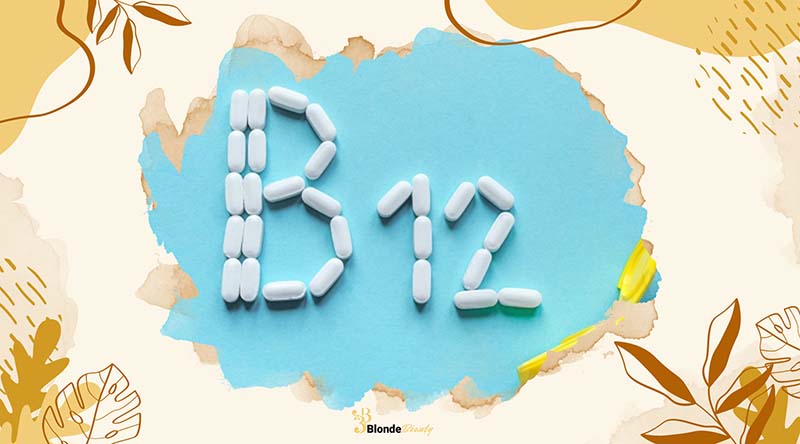In this discussion, we will explore the connection between vitamin B12 deficiency and hair loss. You’ll learn why B12 is essential, how to recognize the symptoms of a deficiency, and find out effective ways to remedy it.
By implementing simple dietary and lifestyle changes, you can prevent unnecessary hair loss and promote lush, vibrant locks.
Will Hair Grow Back from B12 Deficiency?
A clinical deficiency in Vitamin B12 can lead to anemia, a condition often associated with accelerated hair loss. Although taking B12 supplements can halt further hair shedding, it’s important to note that regrowing hair once the deficiency is corrected isn’t always guaranteed.
If you’re noticing hair loss and suspect it might be due to nutritional deficiencies—perhaps because of a restrictive diet—it’s wise to undergo blood tests to confirm whether you have anemia.
Additionally, consulting a trichologist at the first sign of hair thinning or balding can provide a timely diagnosis of any underlying conditions affecting your hair’s health. Early treatment significantly boosts your chances of experiencing hair regrowth.

Exploring the Relationship Between Hair Loss and Vitamin B12
Low vitamin B12 levels can significantly impact hair growth and lead to excessive shedding. Here are some key ways B12 deficiency disrupts normal hair health:
- Slowed Cell Division: Vitamin B12 is crucial for DNA production and cell replication, both essential for hair growth from follicles. Insufficient B12 slows cell proliferation, reducing hair production.
- Disrupted Blood Flow: B12 aids in the formation of red blood cells, which carry oxygen and nutrients to the scalp and hair follicles. A deficiency can reduce the blood supply to hair roots, affecting their health.
- Decreased Hair Follicle Health: Vitamin B12 helps metabolize the nutrients that hair follicles need to stay healthy and productive. A lack of B12 can impair follicle function, leading to hair loss.
- Increased Folate Levels: B12 and folate balance each other in the body. Low B12 allows folate levels to rise, which has been linked to hair loss.
Research indicates that correcting a vitamin B12 deficiency can help treat hair loss and stimulate growth. However, if the deficiency is prolonged, it may cause permanent follicle damage, making the condition irreversible.

Factors Leading to Vitamin B12 Deficiency
Vitamin B12 deficiency can arise from several factors, including inadequate dietary intake, intrinsic factor deficiency, gastrointestinal conditions, autoimmune disorders, certain medications, and age-related decline.
- Inadequate Dietary Intake: A diet low in animal-based foods, the primary sources of vitamin B12, can lead to deficiency. Vegetarians, pregnant individuals, children, adolescents, and older adults are at a higher risk due to insufficient dietary intake.
- Intrinsic Factor Deficiency: Intrinsic factor, a protein essential for B12 absorption, can become deficient due to pernicious anemia, impairing B12 absorption.
- Gastrointestinal Conditions: Conditions such as celiac disease, Crohn’s disease, and other gastrointestinal disorders can interfere with the absorption of B12 in the small intestine.
- Autoimmune Disorders: Autoimmune conditions, such as pernicious anemia or autoimmune gastritis, can destroy cells that produce intrinsic factor or damage the stomach lining, affecting B12 absorption.
- Medications: Certain medications, including proton pump inhibitors (PPIs) used to reduce stomach acid and metformin, a medication for diabetes, can interfere with B12 absorption.
- Age-Related Decline: As people age, the body’s ability to absorb B12 from food decreases, contributing to deficiency in older adults.
- Other Factors: Heavy alcohol consumption can lead to poor dietary intake, impaired B12 absorption, and damage to the stomach and small intestine, contributing to deficiency. Additionally, stomach conditions such as atrophic gastritis, infection with Helicobacter pylori bacteria, and a genetic condition causing a lack of intrinsic factor can also result in vitamin B12 deficiency.

Impacts of Vitamin B12 on Hair Health
Researchers have identified that Vitamin B12, along with Vitamin B9 (folate), might be crucial in the development and metabolism of hair follicles. These nutrients are essential for the formation of red blood cells and the synthesis of DNA and proteins. A deficiency in either B12 or folate can disrupt these processes, potentially impairing cell functions that are critical for healthy hair growth.
A specific in-vitro study highlights that B12 supplementation could stimulate hair follicles to enhance hair growth speed after a transplant. This finding opens the possibility for future applications in hair regeneration, although more studies are required to fully verify B12’s effectiveness in promoting hair growth.
While there’s no direct evidence linking lower levels of B12 to hair loss, there is an association noted in scientific literature between B12 deficiency and premature hair greying. In a study involving 52 young individuals with premature greying, a notable deficiency in both B12 and folic acid was observed in the test group, unlike in the control group.
Strategies to Reverse Hair Loss Due to B12 Deficiency
Addressing a vitamin B12 deficiency involves a comprehensive approach that includes hair loss treatment, dietary modifications, and lifestyle adjustments. Here are several effective strategies to correct a B12 shortfall:
- B12 Injections: Administered by a healthcare professional, these injections rapidly increase B12 levels, crucial for severe deficiencies.
- Oral Vitamin Supplements: Daily supplementation with B12 pills helps maintain sufficient levels, particularly useful for those with mild to moderate deficiencies or as a continuation after injections.
- Dietary Sources: Incorporating B12-rich foods like beef, eggs, and dairy into your diet is beneficial. For vegans, nutritional yeast and tempeh are excellent sources of vitamin B12.
- Address Underlying Causes: It’s vital to treat any medical conditions that may be contributing to the deficiency, such as autoimmune disorders or celiac disease.
- Reduce Stress: Since chronic stress can deplete B12 stores, engaging in relaxation techniques like yoga and meditation can help manage stress levels.
- Check for Drug Interactions: Certain medications, including proton pump inhibitors, may affect B12 absorption. Discussing these with your doctor is important to adjust your treatment if necessary.
- Supportive Over-the-Counter Products: Some shampoos, serums, and foams are designed to support the recovery from deficiencies and enhance hair growth.
Maintaining adequate B12 levels is essential for healthy hair growth. Always consult with a healthcare provider to tailor the right treatment plan for your specific needs. While hair regrowth can take time, consistent treatment will gradually help you regain healthier, fuller hair.

How Much Vitamin B12 Is Too Much?
The daily recommended intake of vitamin B12 for a healthy adult is 2.4 micrograms. Consuming vitamin B12 through food sources typically poses no risk of overdose, as this nutrient is water-soluble. Excess B12 is processed by the kidneys and eliminated through urine, ensuring that the body maintains a balance.
During pregnancy and lactation, the body’s requirement for vitamin B12 slightly increases. Pregnant women should aim for 2.6 micrograms per day, while lactating women need about 2.8 micrograms. This adjustment helps support the increased metabolic demands and the developmental needs of the fetus and newborn.
Conclusion
Although vitamin B12 deficiency has been associated with hair loss, there is no definitive clinical evidence to prove this link conclusively. Hair loss is generally influenced by factors like genetics, age, medical conditions, hormonal fluctuations, certain medications, and stress.
Numerous products on the market claim to combat hair loss with ingredients like vitamin B12. However, while vitamin B12 is crucial for overall health, it is unlikely to significantly affect hair regrowth. Will hair grow back from B12 deficiency? If hair loss is truly due to a B12 deficiency, addressing this deficiency might help in some cases, but results can vary.
For managing hair loss and encouraging hair growth, it is advisable to rely on treatments with a proven track record, such as minoxidil and finasteride, which are widely recognized as effective solutions.
Don’t forget to check out more blogs from Blonde Beauty for additional tips and insights on achieving your best hair ever.

Laureate Professor Clare Collins
Professor Clare Collins is a leading expert in nutrition and dietetics at the School of Health Sciences, part of the College of Health, Medicine and Wellbeing. Her work is changing the way we think about food and health. She grew up as one of nine children and was the first in her family to finish high school and go to college. This background gave her a strong work ethic and a deep appreciation for seizing opportunities.
As the Director of the Hunter Medical Research Institute’s Food and Nutrition Program and a recipient of three NHMRC Research Fellowships, Professor Collins is making a big difference in public health. She focuses on helping people who are often overlooked, using new technologies like apps and online programs to improve their nutrition and reduce the risk of chronic diseases.
Professor Collins is well-respected and has been recognized as a Fellow in four major health and science organizations. She leads a diverse team of experts, including dietitians, computer scientists, and engineers, working together on global health projects.
Her achievements are impressive. She has received over $29 million in research funding, published more than 450 papers, and helped 35 PhD and Master’s students complete their degrees. She’s also active in sharing her knowledge with the public. She has developed tools like the Australian Eating Survey and the Healthy Eating Quiz, and she often appears in the media to talk about nutrition.
PUBLISHED ARTICLES
- Collins, C. (2019). “The Effect of a Pilot Dietary Intervention on Pain Outcomes in Patients Attending a Tertiary Pain Service.”
- Collins, C. (2022). “Variation in cardiovascular disease risk factors among older adults.”
- Collins, C. (2022). “Evaluation of an online intervention for improving stroke survivors’ health-related quality of life: A randomised controlled trial.”
These articles show Professor Collins’s commitment to understanding how better nutrition can improve health. Her work is important for researchers, doctors, and anyone interested in healthy living.
